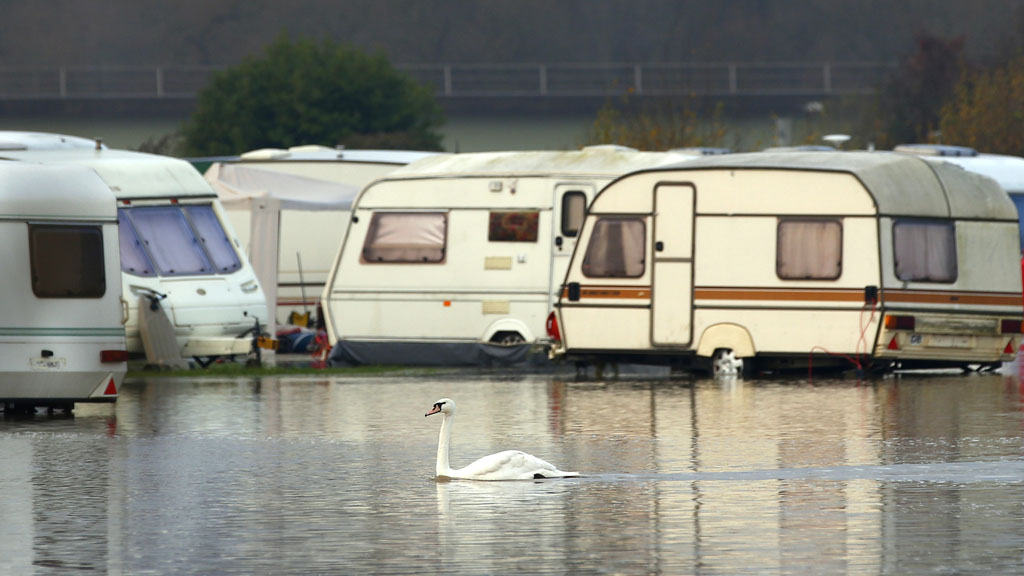Flood insurance cover dispute: key questions
Will we or won’t we be able to get insurance following the flooding that regularly appears to be affecting some parts of the UK? Channel 4 News answers the key questions on flooding.

The issue is over the provision of affordable flood insurance for householders in high risk areas. The existing agreement between the government and insurers dates from 2008 and obliges insurance companies to provide flood cover for properties which are at high risk of flooding.
Why are the Association of British Insurers and the government having words now?
The current discussions have been taking place for some time as the ABI tries to persuade the government to share the risk for properties which are at a much higher risk of being flooded.
The owners of about 200,000 British homes in areas at risk of flooding can afford insurance only because of a deal under which insurers agreed to cover them at a loss in return for a government pledge to boost spending on flood defences.
That agreement expires in July 2013, and the Flood Re scheme had been intended to take its place. Insurers say its successor needs to be agreed by Christmas at the latest to give them time to adapt.
The ABI has asked the government to provide in effect “a temporary overdraft facility to a proposed not-for-profit special insurance fund for 200,000 high-risk households which will otherwise struggle to get affordable household insurance”. This would be used to pay claims if there were severe floods of the kind seen in 2007.
There has been some sabre rattling by the industry about the fallout if no deal is reached. The ABI is trying to turn up the pressure on the government to agree to provide the overdraft, warning that insurance cover may be unavailable unless an agreement is reached.
What is the Flood Re scheme?
Under Flood Re, all households would pay a levy of up to £20 a year into a fund that would cover claims from high-risk homes. The government would initially act as insurer of last resort to guard against an extreme flood that overwhelmed the fund, but taxpayer support would be withdrawn once the fund had accumulated enough cash to handle any likely flood on its own.
The insurance industry was already facing a bill of about £500m in 2012 after heavy rain brought floods in June. The latest flooding could boost total claims to £1bn, accountancy firm PricewaterhouseCoopers has said.
Is there a danger that some people may not be able to get flood insurance in future?
There have been warnings for almost a decade that some areas might become “uninsurable” because of the increased frequency of destructive flooding. Under the current deal, insurance companies promised to provide cover for properties which are at severe risk of flooding. But the deal requires the government to increase investment in flood defences, a promise which critics say is threatened by planned cuts.
In February 2011 the government announced cuts to the number of projects that were to receive funding from 630 to 356. The cuts, adding up to an 8 per cent reduction up to 2015, will see some planned projects cancelled including those for Leeds and Morpeth in Northumberland.
How long will the current bad weather last? Weather presenter Liam Dutton consults his hi-tech crystal ball
The ABI told Channel 4 News that there is the likelihood of some places being unable to get insurance: “If, as is possible, no agreement is reached then once the current agreement ends in June 2013, there will be a free market for flood insurance.
“This will inevitably lead to higher flood premiums and some people – we estimate around 200,000 flood risk households – becoming uninsurable. If we reach this position then the government will have important questions to answer.”
Will that make some people’s mortgages invalid?
Channel 4 News asked the Council of Mortgage Lenders if the current row threatens to affect householders with mortgages. They told us: “Lenders very much hope that a solution that enables households to continue to obtain flood cover at reasonable cost will be found, and the CML urges both the insurance industry and the government to reach a workable solution so that households can continue to obtain buildings cover, including flood cover, at reasonable cost.
“If a solution is not forthcoming, then lenders will need to consider how best to approach this issue with their existing customers, and the extent to which it increases their lending risk on new loans. But at the moment, the focus needs to be on finding a solution to the insurance problem.”
What happens next?
Talks are ongoing between insurers and ministers, with the government seemingly more optimistic about finding a way around the impasse than the industry. As winter gets under way and with it, the possibility of yet more heartache for homeowners, the industry potentially has a stronger hand if the devastating impact of serious flooding continues to occupy news headlines.